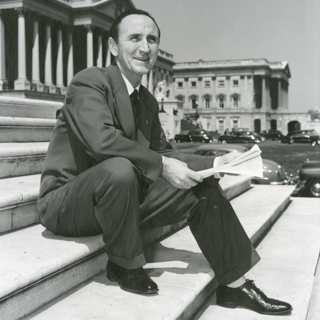Program Impact
…Democracy––as we know it, love it, and understand it––is today facing a challenge as to its very existence. This challenge must be met: met by all who believe in its fundamental processes and who love the liberties and responsibilities of a democracy. – Mike Mansfield, 1939
A veteran of the Navy, Army, and U.S. Marine Corps, Mansfield’s words attest to the critical need for the public to maintain and defend democracy. The Mansfield Center is grounded in rural Montana, engaging under-recognized audiences throughout the Rocky Mountain West, including Montana’s 12 tribal nations. The Mansfield legacy of integrity in public affairs lives on in our civil dialogue and civic engagement programming.
Our activities offer a critical public benefit by creating wide-ranging, research-informed civil society education and outreach strategies from diverse viewpoints that are essential to the success of our democracy and thus national security. These programs reinforce the importance of democratic institutions, media literacy, ethical leadership, and civic engagement. Key program areas include:
· the development of curricula and classroom activities relating to civics education
· student internships relating to democracy and public service
· student and faculty research relating to democracy
· collaboration with business, government entities, and nonprofit organizations to provide civics-related experiences
· seminars, workshops, and training for the development of skills associated with civic engagement
Demonstrated Success in Program Implementation
Our team has extensive experience leveraging proven practices to provide professional programming to support civil society education and outreach. This record of accomplishment includes steadfast and growing relationships with nationwide partners, student achievements, and continued success in competitive and non-competitive federal awards each year. In 2022, the University was ranked by Washington Monthly as first in the nation for highest concentration of community and national service, recognizing our development of engaged leaders.
For the U.S. Department of State, we have successfully managed $35 million in grant funding since 2009 in areas including American democracy, civic engagement, and youth empowerment. In 2022, eight hybrid Dialogues brought together more than 4,000 attendees from 29 states and 22 countries. Registrations for each event are between 400-1,000 individuals, who represent students and community members across Montana and the world. Our 14 exchange programs engaged 528 participants and 62 professors, resulting in 160 student partnerships and 2,700 volunteer hours.
Program Objectives
Many organizations based on the coasts and in urban areas are deeply concerned about the state of American democracy and are working to repair it. The Mansfield Center is uniquely positioned in our physical work to address the urban-rural divide, which is high on the list of polarizing forces impacting civic engagement and effective governance. We work closely with communities often overlooked in the national discourse, as well as provide openings to those who recognize the necessity of addressing the urban-rural divide but struggle to understand the challenges and opportunities in working with rural communities.
A key factor in addressing the urban-rural divide is access to opportunities to learn about and engage in meaningful public discourse. Confidence in American democracy has declined precipitously, in large part due to a lack of opportunities to learn, develop, and practice the skills of civic engagement. In 2022, a study conducted by the Annenberg Center found American citizens have a poor understanding of their government and less than half of Americans can name all three branches of government. Additionally, widespread vulnerability to the manipulation of facts and information is one of the greatest challenges to our national security in both rural and urban communities. Americans are more divided than ever, with one of the greatest schisms along the urban-rural divide.
Our programs strengthen American democracy and thereby national security with the following outcomes:
· Citizens of all ages learn about the importance of democratic institutions and civic responsibilities and build an understanding of and trust in our nation’s governance
· Youth practice the knowledge and behaviors needed to participate in civic life and thus strengthen our system of governance
· Divided Americans come together around shared ideals to foster a more unified nation
· People with diverse viewpoints engage in civil discourse and civic activities
· Citizens understand and prioritize ethics in public affairs
Program Activities
The Center currently engages youth and community members from a variety of backgrounds and demographics across the state and the region. Our programming engages audiences essential to bolstering civil discourse: middle and high school students; college and university students; and citizens of all ages in both urban and rural communities:
Middle and High School Education: Approximately 60 percent of rural youth live in civic deserts: places where there are few-to-no opportunities for people to “meet, discuss issues, or address problems.” Activities support educators and students by offering opportunities for youth to develop knowledge and understanding of government and democracy, with specific outreach to students from rural, military, and indigenous communities, maximizing success by weaving activities into existing curriculum standards.
Higher Education Civic Knowledge Initiative: As demonstrated by such assessments as NAEP, multiple organizations have emphasized the need for institutions of higher education to directly address the shortcoming in civic education. Civil society education is an institutional priority at UM to promote and model civil dialogue and a healthy civic culture.
Community Engagement: Research from Gallup shows that 80 percent of Americans are dissatisfied, or worse, with the “moral and ethical climate” of the U.S. The America in One Room experiment conducted by Stanford University demonstrated that polarization in fellow citizens is reduced when people are brought together to discuss issues in a civil manner. Bringing citizens of all ages together in discussion is a critical component of our programming.
